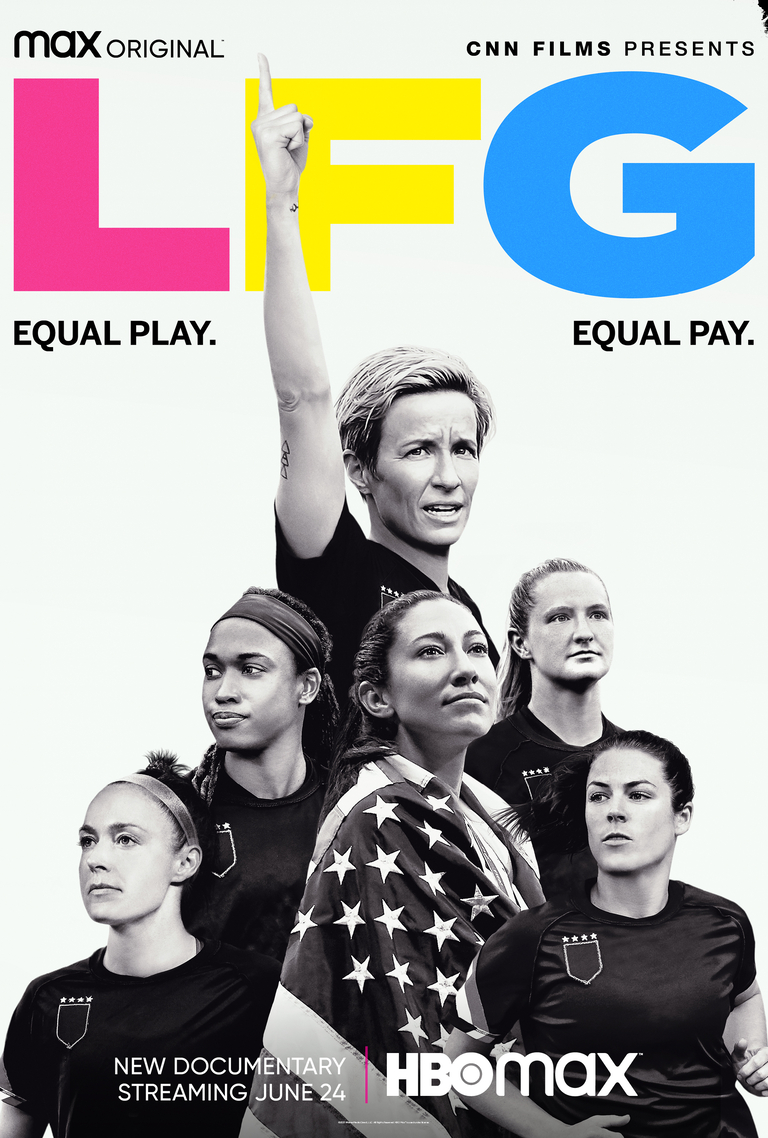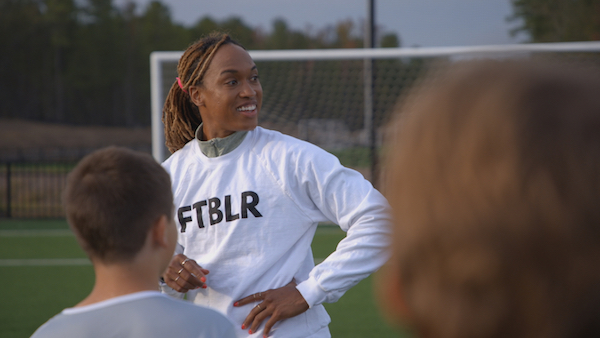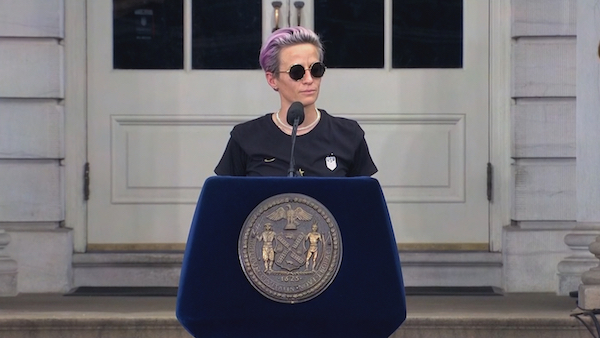
BY WINNIE McCROY | We’ve watched them win four World Cups and Olympic gold medals and cheered them with a ticker tape parade in New York City’s Canyon of Heroes.
“Even though all these accolades sound incredible, we don’t get paid very much,” admits player Jessica McDonald, shown doing pushups with her young son clutched to her back. Scraping pennies together, she said she makes less than some of her friends who are waitresses.
She recalled earning only about $15,000 per season early in her career and having to work a second job. She’s like many talented female players forced to decide whether to live their dream or pursue a career that pays the bills.
Academy Award-winning directors Andrew Nix Fine and Sean Fine take the helm for LFG, a no-holds-barred look inside USWNT’s ongoing fight for equal pay, as told by Megan Rapinoe, Jessica McDonald, Becky Sauerbrunn, Kelly O’Hara, Sam Mewis and others. What do the letters LFG have to do with that? It’s their rallying cry, “Let’s Fucking Go,” albeit in a package more palatable for the moms and kids that make up their fan base.
So, in March 2019—three months before the FIFA Women’s World Cup—the USWNT filed a class-action gender discrimination lawsuit against the U.S. Soccer Federation. The 28 players sought an average of more than $1M each in back-pay damages.
“We’ve been asking for a long time and finally got to the point where we decided to take matters into our own hands,” said O’Hara.
Lead Counsel Jeffrey Kessler illustrated how the (less winning) men’s team makes significantly more for every game they win or qualification they reach. Not only that—Kessler said the men stay at five-star hotels, get charter travel, better fields, more marketing resources, “and the only reason for this discrimination is because they are not men, and that is wrong, it violates the law as we understand it, and that’s what this case is about.”
“Anything less than winning is a failure,” said Sauerbrunn.
Unfortunately, the USWNT’s wins seem to be reserved for the pitch. In 2019, they won the World Cup against Thailand, 13-0, with McDonald believing, “if we win this World Cup, they’ll have no choice but to honor our demands.” When they won, instead of chanting “USA,” fans chanted “Equal Pay.”
“That’s when I began to feel the movement. It’s not just us; it looks like the world is on our side,” said McDonald.
The FIFA World Soccer Organization awarded the women $30M—as opposed to the whopping $400M men received when they won in 2018. But Kessler said, despite these gender inequities, the case wasn’t about FIFA, who pays the money directly to the U.S. Soccer Federation. It’s the USSF that decided to put that money in their pockets rather than in the players’.
“They refuse to pay the women equally because they thought they could get away with it,” said Kessler. “You cannot treat women like this in the workplace and get away with it. If I didn’t think we could win, I would have never taken this case.”

The USWNT kept the faith. They followed their World Cup win by beating Chile, Sweden, and Spain. In 2020, anticipating a win against Netherlands, Rapinoe rebuffed a reporter’s question about their obligatory visit to D.C. with a laugh, saying even if she won, “I’m not going to the fucking White House.” Trump launched a Twitter war against Rapinoe, the pink-haired poster child of working-class parents. The USWNT beat Netherlands 2-0—but didn’t visit Trump.
They returned to start mediation, hoping the USSF would offer a potential settlement. But President Carlos Cordiero’s words on the steps of NYC’s City Hall that, “We hear you, we believe in you, and we’re committed to doing right by you…. and that’s why U.S. Soccer has invested more than any country in the world” proved hollow.
As Rapinoe said on The Rachel Maddow Show, “just because you’re better than someone who’s bad doesn’t necessarily mean you’re good.”
In mediation, Kessler rebutted the USSF’s argument that some of the women made more than some male soccer players, saying the women play and win more games and World Cups. Since 2015 the women’s team has made more revenue for the USSF and received the highest TV sports ratings for any soccer team. The USSF countered that the women agreed to this pay. But they say they were never presented with the men’s deal during collective bargaining. As Kessler said, “The women’s team is doing the same job on the same field, except they do it better and get paid less.”

The USSF responded by hiring lobbyists to go around D.C. and convince elected officials that paying women less money was a good idea. So, after games and on weekends, the players worked on the case. They penned a letter to USSF restating their request for equal pay. They cleared their schedules for three days during mediation, with the baseline belief they’d emerge with something that addressed the inequities. Both sides remained at an impasse, with the USSF accusing Rapinoe of acting in an inflammatory manner during the proceedings.
“We keep wanting for them to make the right choice and they just never do,” said O’Hara.
With a May 2020 jury trial approaching, Kessler began depositions. In a six-hour deposition, Cordeiro admitted that they never offered women the same deal as the men. The USSF argued that it was “indisputable science” that the women’s team was inherently inferior in skill, ability, and responsibility to the U.S. men’s team because of gender. Following the Clippers’ move, the USWNT played their next game with their practice jerseys inside-out, in a show of protest.

“It’s not easy to constantly have to demand your worth or tell people how good you are or tell people you deserve to be a full human,” said Rapinoe wearily.
The media pounced, sponsors pulled out in disgust, and Cordeiro was forced to resign. Cindy Parlow Cone, the USSF vice-president and former USWNT stalwart, became president. A new law firm was set to take over. Things seemed poised for the USWNT to finally get that back pay they were fighting for.
Then, on May 1, 2020, Judge R. Gary Klausner dealt a savage blow by dismissing the players’ argument that they were systematically underpaid, saying they had earned more than the men’s team during those years. Rapinoe argued they worked twice as hard, won more and at the highest levels to reach that level of pay. She and her teammates vowed to appeal the decision in the Ninth Circuit.
“Women are paid less to do the same job. Ultimately it is not us against them, because if they win, no one wins. But if we win, everyone wins,” said Rapinoe. Together, Rapinoe and her partner, Seattle Storm basketball player Sue Bird, have dedicated their lives to the fight for equal pay. Celebs lined up to lend their support, from the Bidens to Oprah to Snoop Dogg. Youth teams and foreign leagues stumped for #EqualPay. But the fight continues.
“I want the U.S. team to be remembered as a team on the right side of history. I want to tell my kid that we can break barriers, and that that’s exactly what we did,” said McDonald.
The USWNT has not yet won their fight. But earlier this year, the Biden-Harris Administration proclaimed March 24, 2021, as National Equal Pay Day. And Rapinoe and her teammates finally went to the “fucking White House.”
Runtime: 105 minutes. Directed by Andrea Nix Fine and Sean Fine | Screenwriter, Andrea Nix Fine | Cinematographer, Sean Fine | Composer, Barking Owl | Editor, Jeff Consiglio. “LFG” was recently screened at the Tribeca Film Festival and premiered on June 24 on HBO Max. For more information, click here.
Chelsea Community News is made possible with the help of our awesome advertisers, and the support of our readers. If you like what you see, please consider taking part in our GoFundMe campaign (click here). To make a direct donation, give feedback, or send a Letter to the Editor, email scott@chelseacommunitynews.com.

Pingback: Laal Singh Chaddha Online